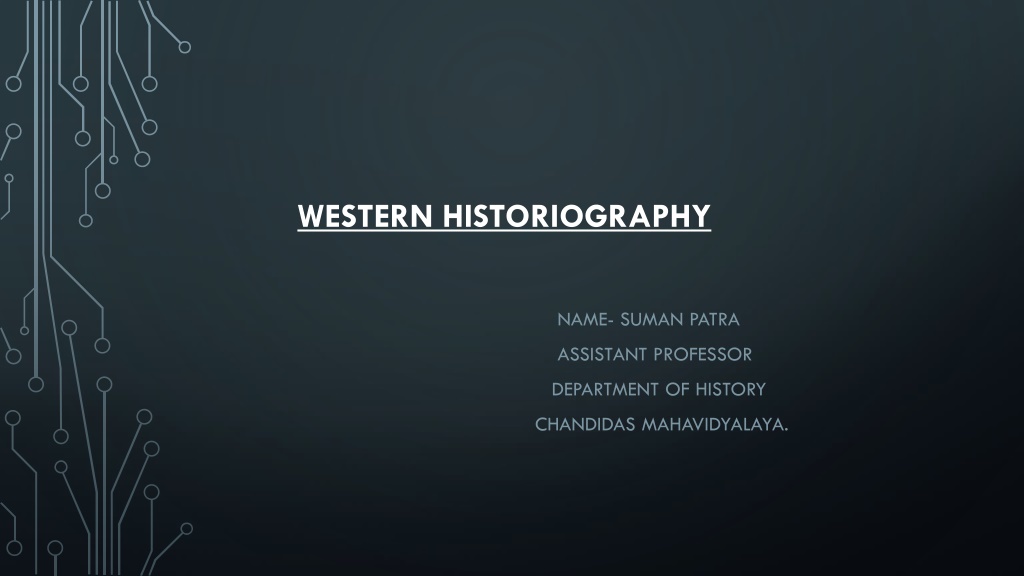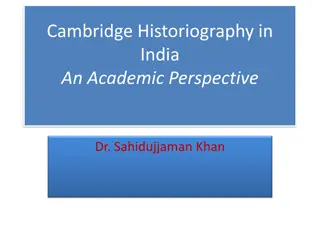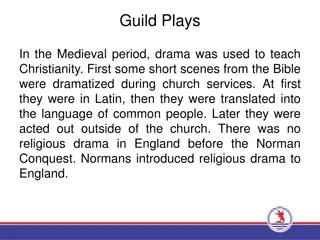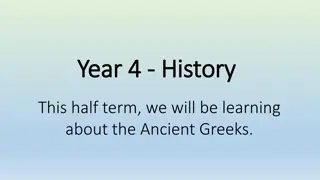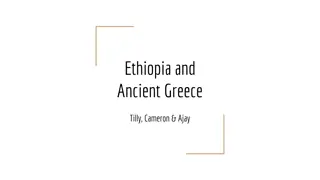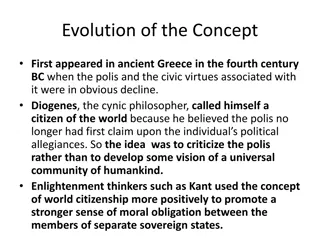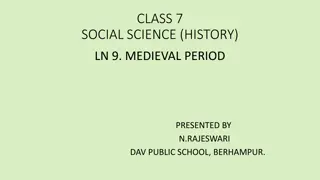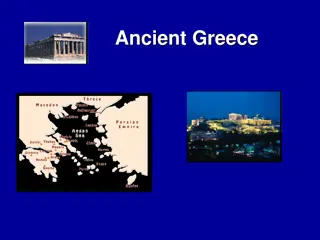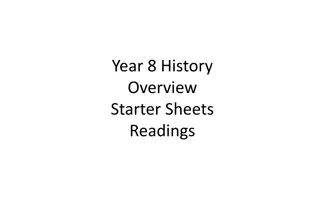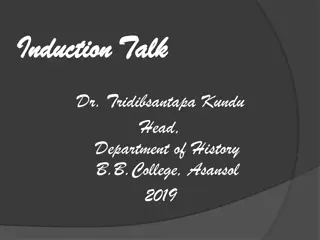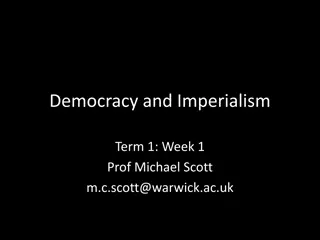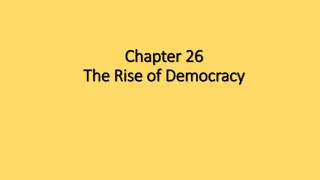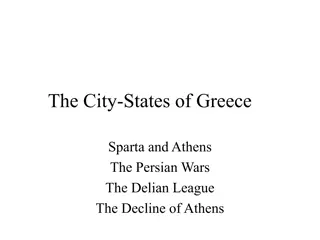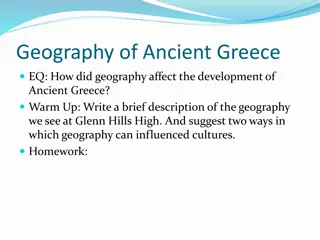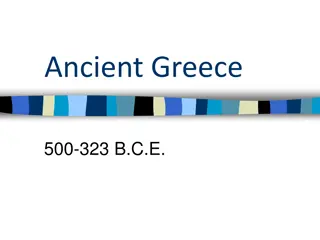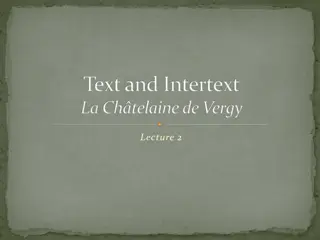Evolution of Historiography: From Ancient Greece to Medieval Times
Explore the evolution of historiography from the ancient Greek historians like Herodotus, Thucydides, and Xenophon to Roman historians like Polybius and Livy. Discover how medieval historiography in the Middle Ages shifted towards chronicling events with less focus on separating fact from fiction.
Download Presentation

Please find below an Image/Link to download the presentation.
The content on the website is provided AS IS for your information and personal use only. It may not be sold, licensed, or shared on other websites without obtaining consent from the author. Download presentation by click this link. If you encounter any issues during the download, it is possible that the publisher has removed the file from their server.
E N D
Presentation Transcript
WESTERN HISTORIOGRAPHY NAME- SUMAN PATRA ASSISTANT PROFESSOR DEPARTMENT OF HISTORY CHANDIDAS MAHAVIDYALAYA.
GREEK AND ROMAN HISTORIOGRAPHY Herodotus is considered the first historian( FATHER OF HISTORY), because in his work appears the conscious desire to record all the significant and noteworthy circumstances surrounding a set of events and motivating the actions of people in those events. Herodotus was remarkable, too, for the scope of his interests; he recorded myths, described customs,
The second great Greek historian, Thucydides , was of a different stamp. In writing the history of the Peloponnesian War he limited himself to matters of state and war. He tried to establish chronology and facts with some exactitude, avoiding the digressions of Herodotus; though his attempt at writing a factual and impartial history was not entirely successful.
The third of the great Greek historians, Xenophon , was more devoted to the purely storytelling aspects of history.
ROMAN HISTORIANS The influence of Thucydides was early in the ascendant, and the two important Greek historians of the Roman period, Polybius and Dio Cassius , more or less modeled themselves on that master. The Roman historian Livy was more of a teller of tales, and he invoked the intervention of the gods to explain cause and effect.
MEDIEVAL HISTORIOGRAPHY Writing history was popular among Christian monks and clergy in the Middle Ages. They wrote about the history of Jesus Christ, that of the Church and that of their patrons, the dynastic history of the local rulers. In the Early Middle Ages historical writing often took the form of annals or chronicles recording events year by year, but this style tended to hamper the analysis of events and causes.[16]
MEDIEVAL HISTORIOGRAPHY FEATURES The concern with separating fact from fiction and legend often disappeared in medieval historiography. Medieval works tended to divide into two types of histories. One was the universal history, which found some inspiration in St. Augustine's City of God;
The other was the chronicle, ranging from the crude and simple annals of local monasteries to more orderly and organized accounts such as those of Saxo Grammaticus , Otto of Freising , Roger of Wendover , and Matthew of Paris. Among the better medieval histories was Bede's Ecclesiastical History, an early model in a branch of historiography that has been of great importance. The biographical or semibiographical accounts of knightly deeds in the Crusades gave rise to the critical history of William of Tyre .
. The greatest medieval Arabic historian was Ibn Khaldun, who created an early version of sociological history to account for the rise and decline of cities and civilizations. In 12th-century Europe secular history writing emerged, shown in the work of Joinville , Jean Froissart , and Comines in successive centuries.
RENAISSANCE HISTORIOGRAPHY The humanism of the Renaissance revolutionized historiography, for it placed emphasis on textual criticism and on a critical attitude toward documents and sources. Men such as Petrarch , Lorenzo Valla , Marsilius of Padua , and Juan Luis Vives did much to produce a more critical attitude toward the past. Revival of classical learning immediately affected historians, and in one sense Niccol Machiavelli and Francesco Guicciardini followed in the steps of Greek and Roman historians, although their work was original and immediate. Critical methods in history were forwarded in the 16th and 17th cent. by the writings of Jean Bodin and Jean Mabillon .
HISTORY IN THE EIGHTEENTH AND NINETEENTH CENTURIES The historians of the Enlightenment wrote broad accounts of social and cultural epochs. Voltaire cultivated the wider, universal view of history, stressing its social and moral aspects. The attempt to get back to the fundamental natural bases of human development was implicit in the Esprit des lois(The Spirit of Laws) of Montesquieu .
19TH CENTURY HISTORIOGRAPHY The father of the new objective school was the great Leopold von Ranke . His efforts and those of his successors, notably Theodor Mommsen , Johann Gustav Droysen established canons of criticism and historical methods. This German school made history writing into a profession and founded the formal academic study of history, though they fell short of their ideal of writing about the past as it actually happened.
The broader interest in the philosophy of history had not died, and the philosophy of Georg Wilhelm Friedrich Hegel had created a school of idealistic historians. Other philosophical views were reflected in general theories, some of the later figures being Oswald Spengler , Benedetto Croce , and Arnold Toynbee . The theories of Karl Marx not only set in motion a continuing series of interpretations of history from the Marxist economic point of view but also affected historians of all other schools.
HISTORY IN THE TWENTIETH CENTURY France: Annales school: The French Annales school radically changed the focus of historical research in France during the 20th century by stressing long-term social history, rather than political or diplomatic themes. The school emphasized the use of quantification and the paying of special attention to geography.[68][69] The Annales d'histoire conomique et sociale journal was founded in 1929 in Strasbourg by Marc Bloch and Lucien Febvre.
Marxist historiography Marxist historiography developed as a school of historiography influenced by the chief tenets of Marxism, including the centrality of social class and economic constraints in determining historical outcomes (historical materialism). Friedrich Engels wrote The Peasant War in Germany, which analysed social warfare in early Protestant Germany in terms of emerging capitalist classes. Although it lacked a rigorous engagement with archival sources, it indicated an early interest in history from below and class analysis, and it attempts a dialectical analysis. Another treatise of Engels, The Condition of the Working Class in England in 1844, was salient in creating the socialist impetus in British politics.
Max Weber's thesis on the connection between the appearance of Protestantism and the rise of capitalism. Christopher Hill's studies on 17th-century English history were widely acknowledged and recognised as representative of this school. E. P. Thompson pioneered the study of history from below in his work, The Making of the English Working Class, published in 1963.
